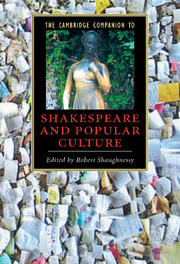Book contents
- Frontmatter
- Introduction
- 1 From popular entertainment to literature
- 2 Shakespeare abbreviated
- 3 Shakespearean stars: stagings of desire
- 4 Shakespeare illustrated
- 5 Shakespeare: myth and biographical fiction
- 6 Narration and staging in Hamlet and its afternovels
- 7 Shakespeare serialized: An Age of Kings
- 8 Musical Shakespeares: attending to Ophelia, Juliet, and Desdemona
- 9 Shakespeare overheard: performances, adaptations, and citations on radio
- 10 Shakespeare on the tourist trail
- 11 Performing Shakespeare in digital culture
- 12 Shakespeare’s popular face: from the playbill to the poster
- Further reading
- Index
- Series List
10 - Shakespeare on the tourist trail
Published online by Cambridge University Press: 28 November 2008
- Frontmatter
- Introduction
- 1 From popular entertainment to literature
- 2 Shakespeare abbreviated
- 3 Shakespearean stars: stagings of desire
- 4 Shakespeare illustrated
- 5 Shakespeare: myth and biographical fiction
- 6 Narration and staging in Hamlet and its afternovels
- 7 Shakespeare serialized: An Age of Kings
- 8 Musical Shakespeares: attending to Ophelia, Juliet, and Desdemona
- 9 Shakespeare overheard: performances, adaptations, and citations on radio
- 10 Shakespeare on the tourist trail
- 11 Performing Shakespeare in digital culture
- 12 Shakespeare’s popular face: from the playbill to the poster
- Further reading
- Index
- Series List
Summary
One side-effect of the increasing veneration of Shakespeare over the course of the eighteenth century – a period that turned Shakespeare from a rough untutored playwright of incidental “beauties” into the National Poet – was the first stirrings of the Stratford tourist industry as we know and love it today. To visit Stratford-upon-Avon today is to visit Shakespeare's town, set in the heart of Shakespeare Country. Indeed, Stratford has been Shakespeare's town for the better part of two centuries, even though the euphoric road signs announcing this are of relatively recent date. The sheer extravagance of the tourist industry in Stratford would seem to a skeptical glance to have developed in defiance of likelihood; on the evidence of his plays and poems (with the exception of the history plays), Shakespeare had little interest in real locations realistically portrayed, and certainly none at all in the area around Stratford – the chief exception being Sly's offhand reference to “Marian Hacket, the fat alewife of Wincot” (Wincot being a village in the environs of Stratford) in the Induction to The Taming of the Shrew. Moreover, the relative scantiness of Shakespeare's biographical record prior to his London fame and fortune, and its thoroughly unromantic documentation of his thrifty prosperity thereafter, might equally and reasonably have damped the spirit of literary pilgrimage. Yet Stratford, an unremarkable and rundown little market town, came as a result of eighteenth-century bardolatry to be looked at differently, and eventually actually to look different. Shakespeare, too, has come to look different as tourism has established itself as one of the principal means by which popular culture understands and exploits him.
- Type
- Chapter
- Information
- The Cambridge Companion to Shakespeare and Popular Culture , pp. 199 - 226Publisher: Cambridge University PressPrint publication year: 2007
- 9
- Cited by



